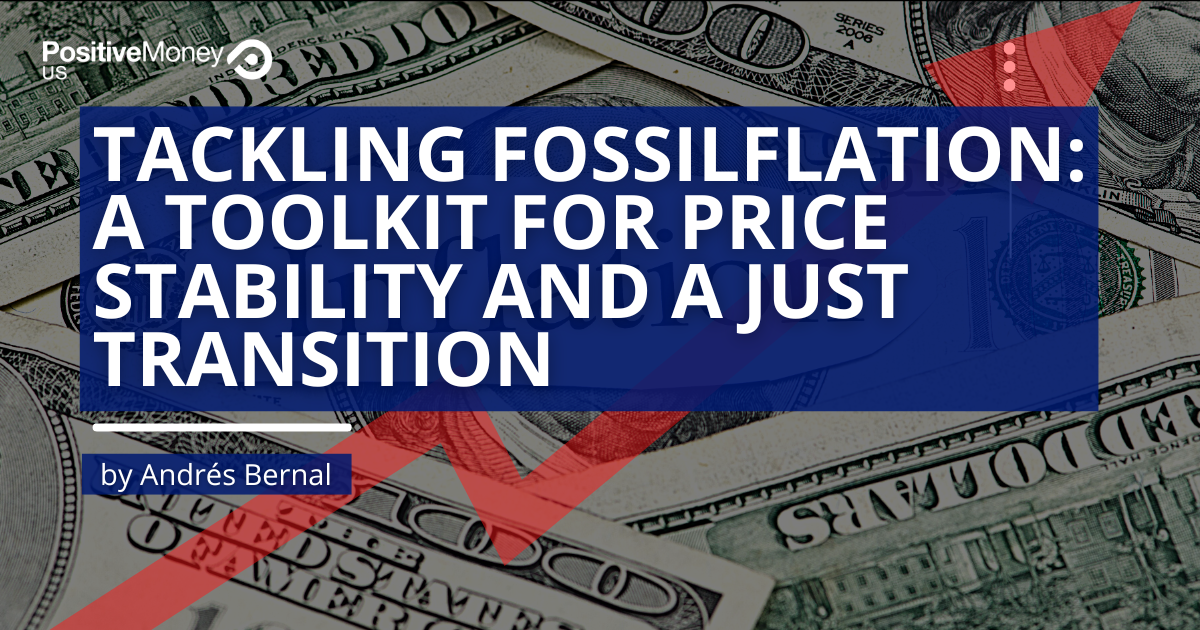New report debunks current approach to tackling inflation, proposes new price stability toolkit.
Washington D.C.— More than half of American voters think raising interest rates is an ineffective way of curbing inflation, and over two-thirds think the Fed should cease rate hikes if doing so puts millions of Americans out of work, according to polling commissioned for a new report published today by campaign group Positive Money US.
The report, Tackling Fossilflation: A Toolkit for Price Stability and a Just Transition, calls for a “bold” new approach to tackling inflation, proposing a comprehensive policy toolkit that could deliver long-term benefits to workers and communities, and advance the transition to an economy powered by renewable energy.
The report calls into question the current approach to tackling US inflation, which relies on the Federal Reserve hiking interest rates, as failing to address the critical factors driving price increases. Rather than demand, the report argues that the main drivers of inflation include volatile fossil fuel prices, geo-political tensions, corporate profiteering, and other supply-side issues. This comes as the Fed continues to raise interest rates, despite fears of inducing a global recession and causing high levels of unemployment in the U.S.
Rather than raising interest rates or cutting back on public spending — which the report argues hurts working people, particularly low-income and communities of color, and could stall spending on climate action — the author outlines a long term strategy for price stability, calling for a reimagining of fiscal and monetary policy to advance a “New Green Industrial Policy”.
Of critical importance, the report argues, is addressing price instability driven by fossil fuels and climate change — polling further showed that 70% of voters think renewable energy production will bring energy costs down, and voters across party lines are concerned that climate change will cause higher consumer prices in the future. The report argues that a just transition to renewable energy will improve price stability and economic resilience, stressing that ecological sustainability and climate justice are central aspects to inclusive socioeconomic well-being. In order to achieve this goal and tackle inflation, the report recommends that Congress and the Federal Reserve consider alternative policies. These include:
- Leverage fiscal policy as part of a full employment and price stability agenda. Expand public investments in housing retrofits, healthcare, energy efficiency, research and development, regenerative agriculture and renewable energy to strengthen social and ecological infrastructure and bring about lower costs through agendas like Build Back Better, Medicare for All, a Federal Job Guarantee, or a Green New Deal.
- Implement a new green monetary policy framework by replacing interest rate tinkering with mission-oriented qualitative and quantitative credit regulations that shift resource use away from unsustainable or socially damaging applications. The Fed can further introduce higher capital requirements to disincentivize fossil fuel lending by banks, and implement a green lending scheme to accelerate the energy transition and complement the core fiscal responses.
- Introduce an Inter-Agency Council on Price Stability to share responsibility and strengthen coordination and communication across government and improve the public sector’s administrative capacity.
In addition to above long-term proposals, the report outlines a number of emergency responses to help lower costs in the near-term. These include:
- Implement targeted price controls, expand healthcare, and implement antitrust reform to provide immediate cost relief, and mitigate profit-spirals and price gouging.
- Pass the Protecting the Right to Organize Act to strengthen a depleted labor force with the bargaining power to protect the public from price gouging.
- Strengthen essential goods and services sectors with free public transportation, and a consumption savings strategy.
- Pass the Farm Workforce Modernization Act to upgrade food production and provide support for farmworkers.
Report author Andrés Bernal said,
“Relying on Federal Reserve interest rate tinkering to prevent and address a phenomenon as complex as price stability is a lost cause. The decades-long economic and policy mainstream presents itself as objective and scientific yet offers a deeply narrow, destructive, and ideologically loaded approach to addressing the complexity of price stability in our era of climate breakdown.
“For those of us that insist on progress and hope in the face of despair, it is critical we clearly identify the relationship between a fossil fuel economy, raging inequality and environmental degradation that makes prices, and therefore the possibility of a dignified future, completely unstable.
“It’s time we replace the market fundamentalism of “natural interest rates” and forced austerity with investments in our collective productive capacities, common sense regulation of market power and destructive resource use, and the most price stabilizing change of all, a green-just transition.
Notes:
- From November 18 to 22, 2022, Data for Progress conducted a survey of 1,249 likely voters nationally using web panel respondents. The sample was weighted to be representative of likely voters by age, gender, education, race, geography, and voting history. The survey was conducted in English. The margin of error is ±3 percentage points. View full polling results here.
- ‘Tackling Fossilflation: A Toolkit for Price Stability and a Just Transition’ can be viewed in full here – https://positivemoney.us/resources/publications/tackling-fossilflation/
- For more information or to speak with a spokesperson, please contact akiksha.chatterji@positivemoney.us or Akiksha Chatterji on 510-988-3230
About Positive Money
Positive Money US is a new research and campaign organization working towards a money and banking system which supports a fair, democratic and sustainable economy. Set up in the aftermath of the financial crisis, Positive Money is a not-for-profit company funded by charitable trusts and foundations, as well as small donations. www.positivemoney.us
###
